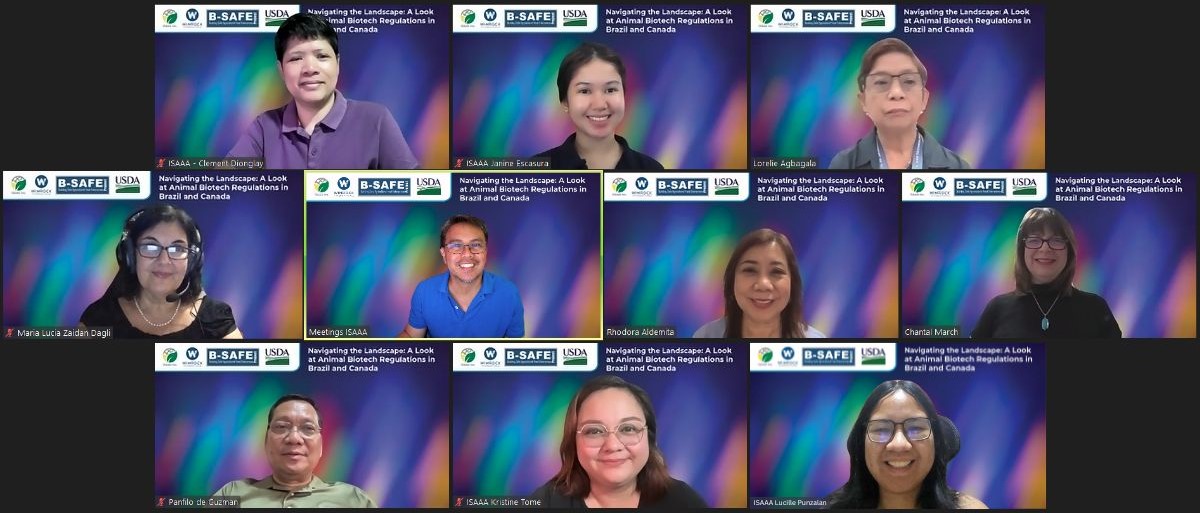
Global Regulatory Pathways for Advancing Animal Biotechnology in the Philippines
April 17, 2024| |
ISAAA Inc., in partnership with Winrock International through the Building Safe Agricultural Food Enterprises (B-SAFE) project, held a webinar titled Navigating the Landscape: A Look at Animal Biotech Regulations in Brazil and Canada on April 11, 2024, via Zoom, to raise awareness, knowledge, and understanding of biotechnology (genetic engineering) applications for livestock and aquaculture.
The webinar was attended by 37 participants representing different agencies in the Philippines, such as the National Committee on Biosafety of the Philippines (NCBP), Bureau of Fisheries and Aquatic Resources (BFAR), Bureau of Animal Industry (BAI), and Food and Drug Administration (FDA). The participants were welcomed by Ms. Maria Lorelie Agbagala, Assistant Scientist and Head Secretariat of NCBP and the DOST Biosafety Committee (DOST-BC). During the opening remarks, Ms. Agbagala mentioned that the webinar aims to provide valuable insights into how regulatory frameworks can facilitate the safe and responsible deployment of biotechnology products in the country.
The webinar featured Dr. Maria Lucia Dagli, a regulator at the National Technical Committee on Biosafety (CTNBio), Ministry of Science and Technology in Brazil, and Ms. Chantal March, the Director of Quality and Regulatory Compliance at AquaBounty in Canada. Dr. Dagli provided an overview of Brazil's biosafety regulation for genetically modified (GM) livestock and emphasized that the Brazilian model of GMO regulation is science-based and has a robust and transparent technical assessment of GM products. She mentioned some important normative solutions, such as RN34 and RN18, which provide the risk classes of GMOs and their respective biosafety levels. Dr. Dagli said that CTNBio is a commission that defines and analyzes GMOs, and they are ready to follow future innovations in biotechnology.
Ms. March then presented their experiences in Canada's regulation of GM fish. She highlighted the three primary government departments responsible for regulating GM animals in Canada, with specific responsibilities and requirements for assessing the products. These government departments include Environment and Climate Change Canada for New Substances Regulations, Health Canada for Novel Food Regulations, and the Canadian Food Inspection Agency for Novel Feed Regulations. Ms. March highlighted five key steps to regulatory success: defining your product, pre-submission consultation, continued communication, quality data and documentation, and recognition of economic opportunities.
An interactive exchange of knowledge and insights among the resource persons and participants followed the presentations, which was facilitated by Dr. Abraham Manalo from the Biotechnology Coalition of the Philippines. Dr. Paul Limson, the Director of the Philippine Agriculture and Fisheries Biotechnology Program of the Department of Agriculture (DA Biotech), delivered the closing remarks, highlighting the value learning from the experiences of other countries in regulating animal biotech products. The event was moderated by Kristine Grace Tome, Program Officer 2 at ISAAA Inc.
Subscribe to the Biotech Updates and follow ISAAA.org on Facebook, X, and Instagram. For inquiries, email knowledgecenter@isaaa.org.
| |
You might also like:
- ISAAA-B-SAFE Webinar Series Continues to Promote Awareness of Animal Biotech
- Biotech Offers Promise in Global Livestock Industry
- Biotech Can Help Save World’s Aquaculture from Climate Change
Biotech Updates is a weekly newsletter of ISAAA, a not-for-profit organization. It is distributed for free to over 22,000 subscribers worldwide to inform them about the key developments in biosciences, especially in biotechnology. Your support will help us in our mission to feed the world with knowledge. You can help by donating as little as $10.
-
See more articles:
-
Plant
- Australia's GM Regulator Approves Field Trial of GM Wheat and Barley
-
Animal
- Experts Discuss How Enabling Policies Can Unleash the Benefits of Animal Biotech
- Global Regulatory Pathways for Advancing Animal Biotechnology in the Philippines
-
Food
- Book Tackles Role of Biotech and Other Tools in the Future of Asia's Food Security
- New Reference Genome of Arabica Depicts Its History and Future
- Scientists Develop Biofortified Rice with High VitB1 Content Without Affecting Yield
-
Health
- New CRISPR Tool Unlocks Potential to Combat Infectious Diseases
-
Environment
- Researchers Develop Chip for Accurate Soil Nutrient Analysis
-
Read the latest: - Biotech Updates (April 24, 2024)
- Gene Editing Supplement (April 24, 2024)
- Gene Drive Supplement (February 22, 2023)
-
Subscribe to BU: - Share
- Tweet

